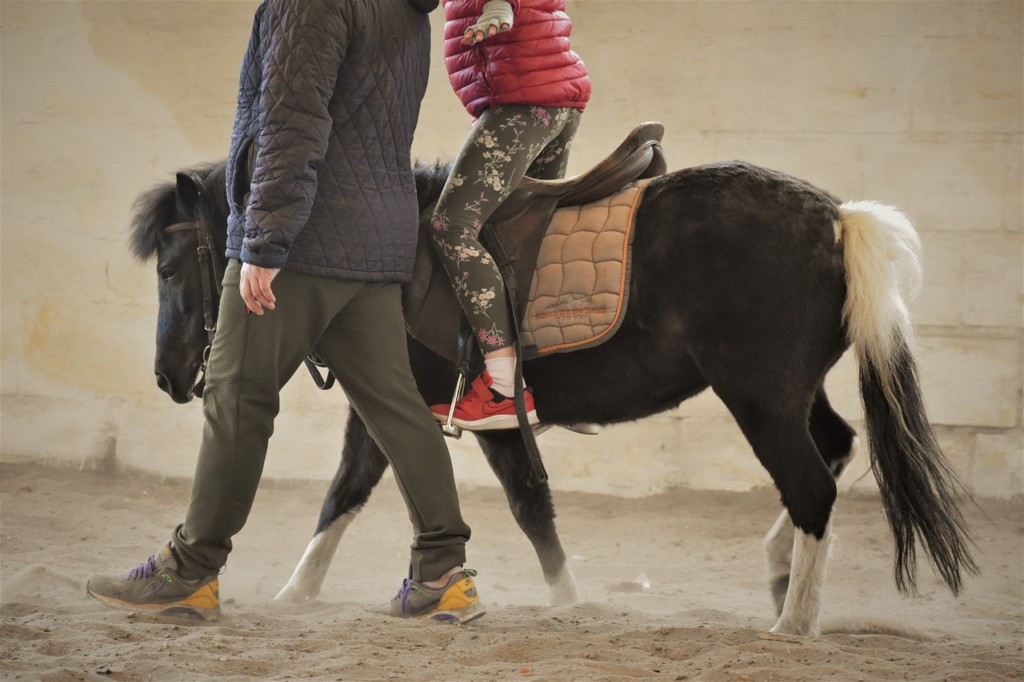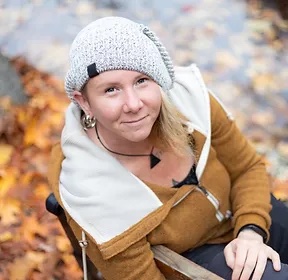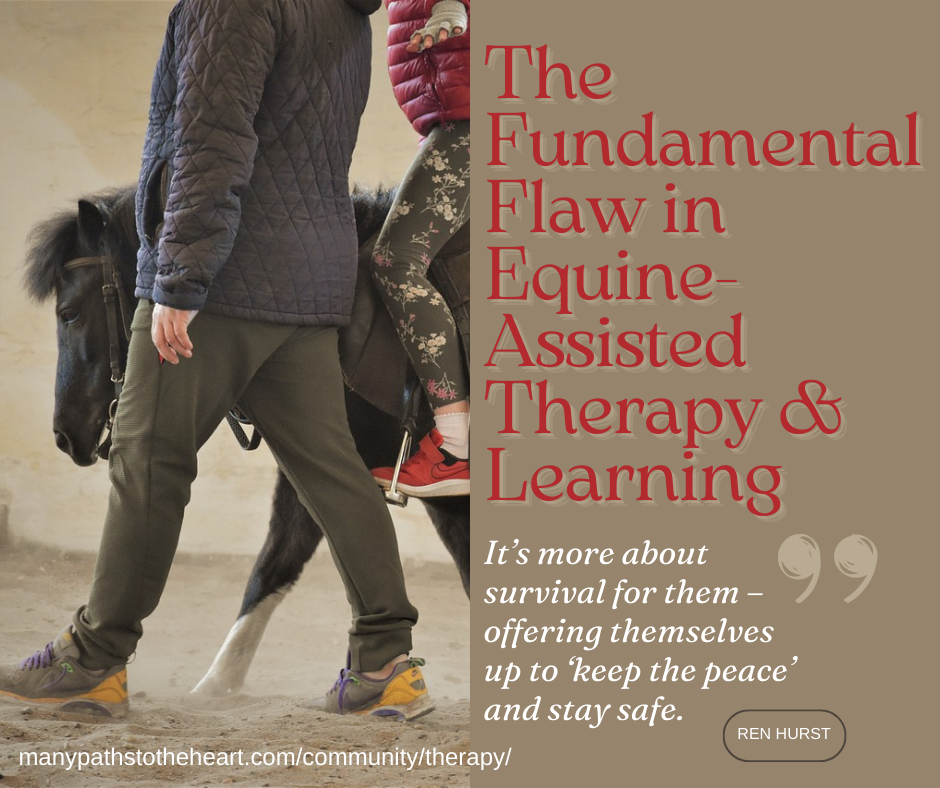Chapter 19 of my first book, Riding On the Power of Others was named “Equine-Assisted Psychosis” for a reason. The publisher’s editor thought it was an error, assuming I meant “Psychotherapy,” which led me to believe she either didn’t read the chapter, or she had some sort of close tie to horse therapy. I knew when I wrote the first book in 2014 that I was barely scratching the surface of the flaw I was noticing, but the continued excavation has given me a tremendous amount of consistency to rely on. Nearly ten years later, I’ve met a lot more therapists and a lot more horses used in therapy, and there are two things I’m sure of: 1) You can’t heal humans by exploiting animals; and 2) Domesticated horses can only offer a skewed reflection as a result of the trauma of their own oppression.

Animals used in therapy are permanently captive dependents, not consenting adults, and power dynamics must be considered before looking at domesticated animals as “healers.” I do not believe that any sort of sustainable, actual healing comes from exploiting those in our care. One may feel better for a while after a session with a horse, but it has come at the expense of someone else’s freedom. True healing is derived from reaching emotional maturity, including and especially a radically accountable relationship to the beliefs and stories we create to perpetuate unnecessary fear. Relying upon a dependent in our care for our own emotional regulation to avoid that maturation process is what keeps us from healing.
In the words of Thomas Jefferson, “Dependence begets subservience and venality, suffocates the germ of virtue, and prepares fit tools for the designs of ambition.” Though I seriously doubt one of the founders of a country built upon exploitation meant to call himself out with this statement, that’s exactly how I read it today. The ambitions of a relatively small group of privileged men were carried out quite dependently upon the abuse and enslavement of the Indigenous populations already here, the Black people they forced across the ocean, as well as countless others including their own wives and children, all in the name of their “independence.” Through their dependency upon the use of others, they became subservient to fear and the gaps in emotional development that have plagued our species since at least the time when domestication began. The reality is that domestication begets emotional dependence, and authentic freedom, or healing, can only be accessed beyond the abuses of power that create such dynamics.
Even if equine therapy helps people build self-awareness, overcome certain challenges, allow an impermanent sense of connection, or develop life skills, it ultimately sets the therapy client up to fail at healing because of the reliance upon the captive-dependent horse. Further, by relying on the sensitivity and embodiment of the horse to do their job for them, facilitators disconnect from their own ability to recognize emotions with the same degree of presence and subtlety.
Using horses in therapy is the same as using any other drug. It often makes us feel better by treating the symptoms, but it does not provide a cure. The cure is only accessible within each of us, ideally modeled by someone who has already found it within themselves, and definitely not available from a captive with no real agency to decide for themselves. Contrary to popular opinion, a permanently captive dependent such as a horse or dog cannot give consent to participation due to the nature of the extreme influence we have over them as a result of their captivity and dependence upon us for their basic needs. Their “yes” cannot be trusted entirely, but their “no” certainly can, and unfortunately, no one with an agenda to use them is looking for the subtlest form of “no” from the animal. When all forms of manipulation and unnecessary control to meet the basic needs of the animal are removed, the “no” gets a lot easier to recognize, and much harder to honor when your intention is to take advantage of their captivity for profit.
The reason it feels so good to be around domesticated horses is because they, like every other domesticated animal, offer judgment-free access to a body ready and willing to help soothe our own bodies. Most people think they are soothing us out of kindness, but the regulation of a captive dependent usually depends upon ours. It’s more about survival for them – offering themselves up to ‘keep the peace’ and stay safe. We often feel seen and accepted in their presence, and they offer instant feedback and immediate forgiveness. Isn’t that the human therapist’s job? Unbeknownst to most equine facilitators, domesticated animals cannot even give the most honest or accurate feedback. Horses in a conditioned state can, in fact, and very often do, hide their truest emotions or respond from their trauma. This isn’t well-known because there are few people around the world today who have actually stopped using captive animals long enough to experience what they are really capable of showing us.
After years of study, exploration, and travel, I’ve yet to meet a horse used for therapy or a learning program that was not in a deep state of learned helplessness. Learned helplessness is “a condition in which a person suffers from a sense of powerlessness, arising from a traumatic event or persistent failure to succeed“ (Google dictionary). Where horses persistently fail to succeed is in the area of being seen and heard. No one can hear you when their use of you is more important than your voice. Over time, similar to humans, horses will resign to their situation as a lesser version of themselves in order to cope. Many are quite content and even seem happy to live this way, as they have no idea something more even exists. Horses don’t spend their days comparing the “now” to the “what could be.” The reason wild born mustangs have a reputation of being more difficult to train is they have a broader perspective of what is available. Sadly, I’ve seen some proud formerly wild stallions kill themselves over being willing to submit to human control.
One significant difference I’ve noticed repeatedly between a horse that has never known emotional freedom and one that has is their depth of awareness. Most horses in captivity appear fairly dissociated compared to a truly empowered, undomesticated horse that enjoys the emotional autonomy that comes from being freed of exploitation and cared for unconditionally. It doesn’t matter how kindly a horse is trained or what methods are used. Trained horses do not behave the same as those who are free to be themselves. No form of training – not praise, positive-reinforcement, or otherwise – can produce a horse that is completely free of the negative effects of being used. This creates a serious limitation in how much effective therapy is actually possible through horses. We can only offer to others what we have accomplished for ourselves. The horse, then, becomes more of a cop-out than an aide for facilitators, and that is how therapy/coaching/learning turns into exploitation and the perpetuation of the very gaps in emotional development that most clients are seeking to heal.
A horse is not any more capable of offering a healing presence to others than a human. It just seems so because they don’t have the same kind of conditioning to overcome and they live more in their bodies than we do. Using them for this instead of learning from their embodied example is the very height of human arrogance. The only thing that makes a horse special for healing purposes is that they are the only animals we form relationships within widespread captivity that are still nearly biologically the same as their wild counterparts. They embody something long forgotten by most humans and give us a glimpse of the connection we’ve lost. Biology, however, does not determine whether or not someone is domesticated.
Domestication has to do with an abuse of power and the resulting limitations it creates. It is an intentional, sustained interruption in emotional development for the purpose of controlling another’s behavior. Emotionally whole, mature animals are not interested in our agendas for them. They move away from that energy. Every. Time. That is feedback that can be trusted.
Many people have been inspired to change their lives after spending time with the undomesticated herd of horses in my care, but in 2017, I stopped allowing curious folks to visit the sanctuary or meet the animals here. I’ve come to the conclusion that there is no way to allow people to come here specifically to interact with the animals in exchange for something without exploiting them. If people want to benefit from what I’ve learned and accomplished with these animals, they get it through me or I coach them in how to relate to their own animals in the same way. The nonprofit I created takes in a small, dedicated few who want to learn to care for the animals and benefit from that structure and responsibility while taking radical accountability for addressing their own trauma and learning how to do what the horses do – feel their feelings without perpetuating a fear-based narrative.
The animals do not heal anyone here nor are they available for any purpose other than to live out their lives as models for what it means and looks like to be undomesticated and allowed to emotionally mature. It took a long time for me to make the dependent/guardian dynamic connection. The animals in our care are no different than our children in terms of their ability to consent because of the grossly unequal balance of power between us. I wouldn’t pimp out my kids to make someone feel better, and I no longer find it appropriate to do the same with the animals in my care. This makes animal-assisted therapies impossible without exploitation, and it creates a tall order for the developing animal sanctuary movement committed to non-exploitation to follow. We need to take the responsibility off the animals to heal our broken world and become an example of the very thing we seek to gain from being with them.
Take a moment to consider the amount of time that goes into learning how to masterfully train an animal to be used in any way. Now, think about the time it takes to develop complete programs, systems, protocol, and organizations around such use of animals. Finally, I want you to imagine what a different world we might live in if each person dedicating their lives to helping people and animals while participating in the exploitation of those animals would just put all of that incredible talent, energy, and focus into healing themselves and becoming an embodied example of the well-being people otherwise seek through therapy. Think about the technological advances and breakthroughs our species might have already achieved if so many of us weren’t so damn distracted by getting our needs met through animals. Think. Feel. Now shake off the chains of your own domestication. You were meant for so much more than this.

©2023 Ren Hurst is the author of Riding on the Power of Others: A Horsewoman’s Path to Unconditional Love and her latest, The Wisdom of Wildness: Healing the Trauma of Domestication. You can get more information on her books, offerings, and the nonprofit she created to address the trauma of domestication at www.rendermewild.com
Join us on September 5, 2023, to speak with author Ren Hurst about her new article, The Fundamental Flaw in Equine Assisted Therapy and Learning.

The zoom call is free and open to Many Paths to the Heart community members. Join today for the link. https://manypathstotheheart.com/community/ren-hurst-talks-about-the-fundamental-flaw-in-equine-assisted-therapy/
Tuesday, September 5th @ 12:00pm Pacific, 3pm Eastern, 8pm UK, 9pm most of Europe,
5am Wednesday in Sydney, Australia, 7am Wednesday in New Zealand.
What a gift! Five years ago Noah was founded as an animal welfare 501c3 , after being denied for 2 years for approval. Our organization is in someway the black sheep of the equine industry because we believe as you do. Our mission states that our purpose is to help eliminate all abuse, neglect or exploitation of any living creature. We have 2 rescue horses that are named after the wise men Caspar and Balthazar and will someday find a 3rd horse Melchior to complete the “Magi herd”.These sentient creatures come bearing gifts just by being who they are free and natural at no cost to the observer.That is our program for all others to just enjoy being in their presence, However none of any boarding properties so far agree with this purpose or allow visitors for this cause. We support you and thank you for your message.
May a much needed change result from all your efforts for their benefit and ours.
Dear Ren…. I agree with much of what you said the biggest issue for me is the taking of money for horse interaction. I would classify you experience with horses in the wild as equine therapy, you are on a journey together with horses into the modern pathway of life on this earth. Also, your consideration and observation has occurred through the mind and feeling……. It seems you have not engaged in psychic or telepathic interaction with the universe, in fact I sense you may even doubt this exists. Animals are living bodies inhabited by spirit. As such, spirit can choose to cross paths with you on your journey, even if it is a domestic situation. I believe you chose to come to this existence, chose your mother.It is hard to see your blind spot
It may be necessary to define what kind of equine-assisted therapy you’re talking about. I observe my friend’s groups with clients from an addiction treatment center who come to our ranch once a week or every two weeks while they are in the treatment program. They observe our horses and sometimes interact with them, but the focus is on what the clients feel and project onto the horses as they observe. The horses are typically free to stay away although there are occasional exercises where the clients lead the horses and observe their own reactions to the experience. The “therapy” part consists of what the facilitator helps the clients understand about how they feel and how their issues are reflected in the horses’ behavior. If a horse is not interested in participating they are typically given the choice to opt out. I’ve heard of other types of EAP, where clients get intensely into their trauma while with the horse, but this is not what’s happening at our ranch and our horses, though obviously confined to the property, seem mostly curious about the humans who come to visit with them.
Definitely a very true idealistic way to look at things. I do believe most people do not listen to the horse and are pushing the horse to do what they want because they have a business that they are trying to run. That needs to change. People need to learn to listen and be mindful. There is alot of work to be done on this planet to raise the vibration and dissolve the patriarchal matrix that we are all caught up in. Planetary Ascension is now taking place. To live in peace with all is the goal. I do believe that the horses are here to help as they always have been. Unfortunately they are so abused. I work at a therapeutic stable. I am trying to make changes. If we limit our contact with horses, we limit opening the eyes of others to do better. We are all here to do service to help others.
Many blessings 🙌 to you Ren.